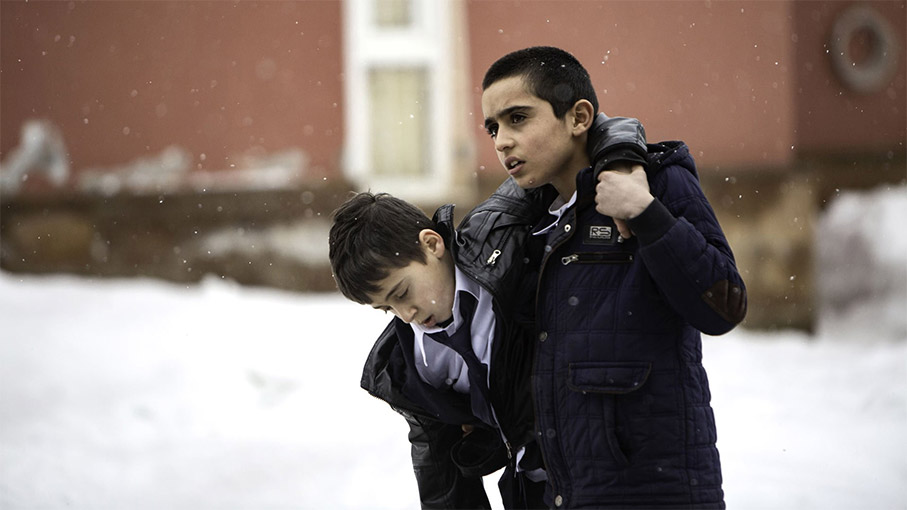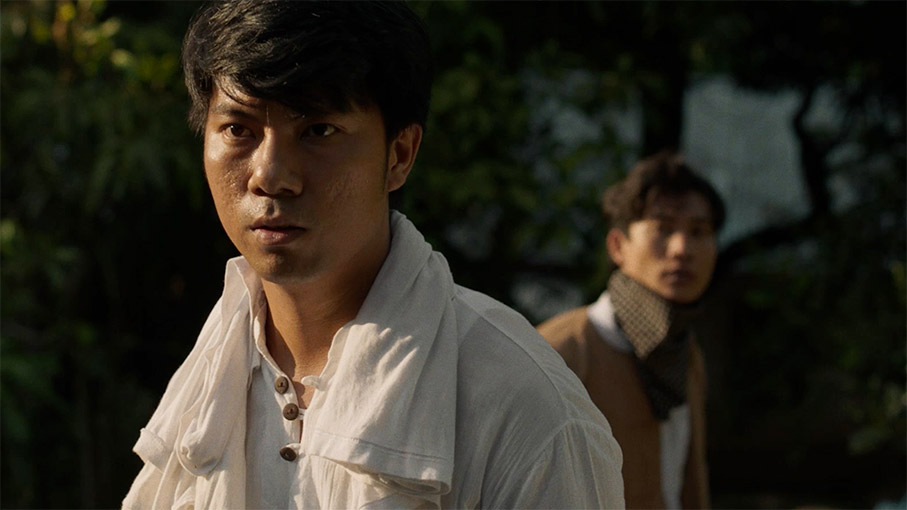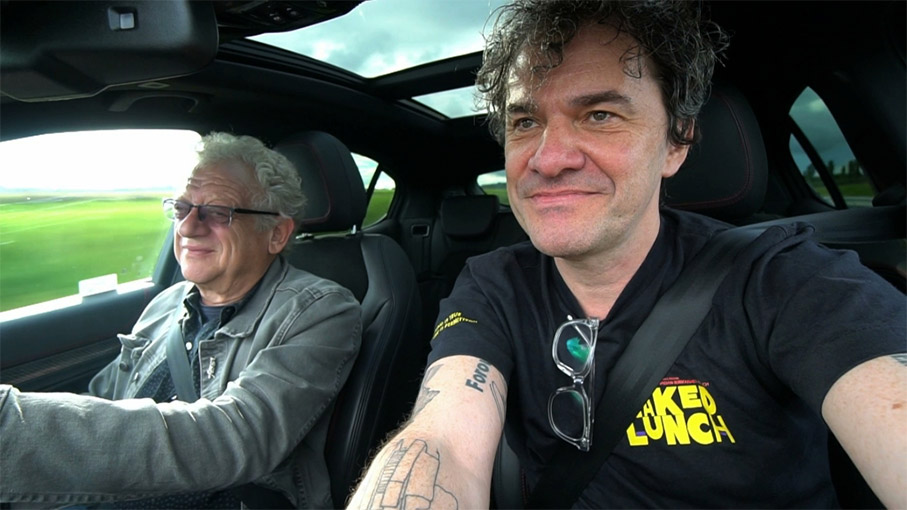|
Yes, this may seem to have come out of nowhere, in part because I have all but abandoned the site blogs I have repeatedly pledged to keep going and more regularly write. Blame it on my continued health issues or my deepening depression at the state of the world and the clown car of dangerous idiots in charge of this beleaguered corner of it, but I’ve lost count of the number of times I’ve sat down to write a blog detailing what we’re up to, only to wheeze a sigh of exhaustion and close my laptop lid. In the absence of such a document, here’s a quick intro to this and what I hope will be a string of subsequent pieces.
The 2021 London Film Festival began yesterday, and in common with previous years, Jerry Whyte and I have been granted press accreditation and will be covering as many of the films as we can find time for. My health and my continued reluctance to expose myself to potentially infectious crowds restricts me to online screeners once again, which this year are being made available only a few hours before the public screenings. As I’m also working at my day job for most days of the festival, my initial plan to write and post reviews of each day’s films the evening after the screenings quickly fell on its face. I’m thus aiming to post a dispatch each day featuring capsule reviews of the films that I saw on the previous day. This kicks off below with coverage of three of the four films that I caught yesterday. The fourth will be addressed by Jerry at a later date in relation to another title he is planning to cover. As I tend to spend at least two days working on each of my regular reviews, this will be a case of quantity over quality, short, first impression reviews that I hope to get the chance to expand on later when and if the films secure a wider release.
And so, to the films shown on Wednesday 6 October 2021.
At a tough, authoritarian boarding school in the wintry snowscape of the Anatolian mountains, 12-year-old Yusuf becomes concerned for the wellbeing of his good friend Memo, who seemed fine the previous day but this morning is so ill that he is unable to even sit up in bed. Faced with a disinterested and preoccupied staff, Yusuf all but carries his friend to the school’s sick room, whose student monitor pops an aspirin in Memo’s mouth and sends Yusuf back to class, promising to stay put and keep an eye on the now unconscious boy. But Yusuf is unable to concentrate on his classes, and several attempts later he finally convinces one of the teachers to check on Memo’s condition, which by then has become a very real cause for concern. As attempts to secure a driver or an ambulance or even to transport Memo to hospital in a staff car are scuppered by the snow and ice in the school grounds and the surrounding roads, members of staff begin pointing fingers of blame at each other for triggering an incident that has put the life of one of the children in their care at serious risk.
From its opening close-up of the back of Yusuf’s head (one that will be hauntingly reversed at the end), which then follows him and other boys as they walk to the shower block, Brother’s Keeper had my undivided attention. Shot handheld in a documentary manner, but mercifully free of the artificial waggle-cam of so many faux-documentary projects, it paints a sobering picture of a school that is run more like a British Borstal of old, where transgressions can earn you a slap to the face, and the shower room prefect behaves almost like a trainee concentration camp kapo. This is brought home in the opening scene, when Memo and another boy get into an argument while washing, and the supervising teacher orders that they shower themselves in cold water as a punishment, something the prefect ensures they keep doing until the end of the wash period. Initially, it seems likely that this that is the root cause of Memo’s condition, and it certainly becomes the trigger for the first of the many accusations that subsequently start flying. But as more and more teachers, support staff and students are questioned by the agitated Principal, it begins to look as if there’s more to this than a case of negligence-induced hypothermia.

There are some impressively naturalistic performances here – two sequences set in classes feel disarmingly real – but special mention must go to young Samet Yildiz, whose portrayal of Yusuf is so perfectly pitched and effortlessly sympathetic that I quickly found myself knotted up with frustration at the disinterest shown by the teachers he attempts alert them to Memo’s condition. Later, when he borrows a smuggled phone to call his mother and tries to tell her how worried he is for the welfare of his friend, the tears he is reduced to by her “never mind that” attitude is genuinely affecting.
Surprisingly, given the downbeat story and the overriding air of realism, director Ferit Karahan somehow works some blackly comic elements into the mix that do not disrupt or make light of this increasingly worrying situation. Seemingly everyone alerted to Memo’s condition feels obligated to feel his face and proclaim, mantra-like, that he doesn’t have a fever, while the inability of the staff to get a clear mobile phone signal ends with them having to balance on a chair by the window to make increasingly urgent calls. The most openly comic aspect involves a slippery patch of floor immediately inside of the sick room door, which just about everyone who enters nearly slides over on, a running gag that peaks when the cleaner enters, slips up, and then asks the disbelieving principal, “Where do you want me to mop?”
The main drive of the film, however, lies in Yusuf’s deep concern for the deteriorating health of his friend, which quickly comes to envelop him and drives him to ignore the looming threat of punishment and keep pestering teachers until he can get someone to listen to his concerns. It builds to a late-film discovery that I have no intention of spoiling, one that really hit me hard and that prompts an immediate rethink of all that has gone before and cries out for the second viewing I’ll only get if the film lands the UK release it deserves. Here’s hoping.
Young Burmese straight-to-DVD action movie director Wai Bhone is having a few problems with his first low-budget theatrical feature. His leading man has timekeeping issues, his lead actress has to write longer lines of dialogue on her hand, and his producer and money man demands substantial changes to the script to ensure the film will conform to the 1996 Motion Picture Law. He’s behind on the rent of the apartment he shares with his wife Seazir and his young daughter Meemie, and every evening the electricity cuts out and plunges every room into darkness and candlelight. Things take a turn for the worse when he hires his alcoholic brother-in-law Zaw Myint as an extra. When his star fails to show for a fight scene, Wai elects to shoot the whole thing handheld from the actor’s viewpoint, a plan that goes south when the over-eager Zaw takes a swing at the camera and smacks it hard enough to wreck it. It’s a downturn of events that Wai elects to keep from his wife, but she has bad news of her own, having just learned that the bank in which they keep what little money they have saved for Memee’s education, has become insolvent. With no end to their financial problems in sight, Wai is reluctantly forced to consider Zaw’s plan to rob the failing bank of its remaining cash on the morning the money is due to be shipped out.
In terms of how the story unfolds, there’s not a lot that experienced moviegoers won’t have seen before in one form or another, from the series of mishaps required to prod an honest man towards criminal activity to Wai and Zaw’s amusingly amateurish approach to the robbery, the drive to which is interrupted to take a dog they accidentally run over to a veterinary surgeon. Yet there’s something about first-time feature director Maung Sun’s light touch and unhurried pacing, coupled with some low-key social commentary and a sly dig at the film industry, that gives Money Has Four Legs its undeniable charm.

The tone is set by the opening shot, in which producer Tin Htut tears through Wai’s script firing off a seemingly endless list of required, Hays Code-like changes, including the comical suggestion (and this has to be interpreted through subtitle translation) that the word “motherfucker” be changed to “futhermucker.” Amusingly, when his star fails to show up for the shooting of the camera-breaking action scene, Wai expresses his frustration by blurting out this made-up word, after first catching himself about to let rip with its sweary original. It’s the first of two occasions when Wai’s film feels as if it’s seeping into Maung Sun’s own. The second arrives later in the form of a final shot and credit roll that appears to be providing an ending for both films, but which is then interrupted and reset by a twist that provides Money Has Four Legs with a further twenty minutes of story.
It’s in Wai’s slowly crumbling relationship with Seazir and his bond with Meemie that the heart of the film lies, as they struggle to get by in a run-down apartment that the landlady brings prospective new tenants round to view when the rent is late. Commentary on the problems facing any prospective local filmmaker is peppered throughout, and includes a telling scene in which Wai and Zaw decide to rent one of their earlier films, and are handed a bootleg DVD at a ramshackle store whose owner couldn’t care less that she’s serving the film’s director and one of its actors. The comic moments, meanwhile, tend to be more smile-inducing than laugh-out-loud uproarious, but I did let out a laugh when Wai and Zaw drive up to the bank with their goddess masks and movie-prop gun to find it besieged by angry customers. Realising that they are in the same position as him and have likely also lost their savings, Wai remarks to Zaw that they are “people like us,” to which Zaw responds questioningly, “Bank robbers?”
| THE STORMS OF JEREMY THOMAS |
|
Jeremy Thomas is one of the few contemporary film producers whose name is as well known by cineastes as those of the directors he works with. And Thomas has worked with some of the best. To list them all and the notable films on which he is credited as producer or executive producer would take a couple of lengthy paragraphs, but here’s a mouth-watering sample: Nicolas Roeg (Bad Timing, Eureka, Insignificance); Stephen Frears (The Hit); Bernardo Bertolucci (The Sheltering Sky, Stealing Beauty, The Dreamers); David Cronenberg (Naked Lunch, Crash, A Dangerous Method); Ōshima Nagisa (Merry Christmas Mr. Lawrence, Gohatto); Jonathan Glazer (Sexy Beast); Kitano Takeshi (Brother); Miike Takashi (13 Assassins); Jim Jarmush (Only Lovers Left Alive)… Oh, I’d better stop there, but a quick peek at Thomas’s IMDb page will reveal a good many more. The son of director Ralph Thomas (most famous for the ‘Doctor’ series of comedies), and nephew of ‘Carry On’ director Gerald Thomas, he was born into British cinematic royalty, but quickly found himself drawn to projects in which art took precedence over commerce. Sometimes, however, one paved the way to the other, as with Bernardo Bertolucci’s The Last Emperor, which cleaned up at the Oscars and recouped more than twice its budget at the box office.
The Storms of Jeremy Thomas is a portrait of the man and his career by respected film documentarian Mark Cousins. Having initially failed to warm to Cousins when he was chosen to replace the irreplaceable Alex Cox as the host of the BBC’s excellent Moviedrome cult movie series, I had to swallow such shallow prejudice a few years later when I sat down for The Story of Film: An Odyssey, a mesmerising, phenomenally researched magnum opus that proved to be as entertaining as it was educational. It also confirmed one thing that a more unbiased re-watch of his Moviedrome intros first clued us into, that Cousins has an unbridled and infectious passion for cinema and the greatest of respect and admiration for its talented creators.

I can’t help feeling there’s a hidden logic behind the idea of a Cousins documentary on Jeremy Thomas, as if Cousins were to make a film drama, then Thomas is the sort of producer who would be drawn to what would likely be an unusual and interesting project. There’s certainly evidence that the two hit it off and even became friends before the shooting started, a relationship that handily breaks down the barrier between filmmaker and subject and enables Cousins to shrug off the standard approach to biographical documentary. He instead builds his film around Thomas’s annual trip to the Cannes Film Festival, a 1,000 mile journey that he prefers to drive himself over the course of four or five days, this time with Cousins as his passenger. It’s a journey that Thomas claims will allow them to look at special places, talk movies, and listen to good music, which frankly sounds like a trip any cineaste worth their salt would enjoy. And Thomas is as good as his word, stopping off at historically interesting locations, playing and even singing along with songs that Cousins doubtless then had to then get clearance to use in the film, and talking in fascinating detail about his career.
Many of Thomas’s movies are discussed and analysed, often in depth and with focus on specific scenes and underlying themes. Bad Timing, Crash and The Dreamers feature prominently, but Thomas’s opinion is sought on a wider range of topics, from the creativity of films he did not work on – Dreyer’s The Passion of Joan of Arc, anything by Powell and Pressburger and the final shot of Kiarostami’s 10 on Ten are all cited – to the anti-establishment politics of the late 1960s and his attraction to all aspects of counterculture. Cousins makes rich and illustrative use of film clips (there’s some excellent movement continuity between these clips and the documentary footage, the work of Cousins’ regular editor, Timo Langer), footage shot at Thomas’s home before the journey began, and close-shot interviews with actors Debra Winger and Tilda Swinton. The final third of the film takes place in Cannes, where discussions continue and Thomas meets up with celebrated Japanese director Miike Takashi, whose latest, Thomas-produced film, First Love, is screening at the festival.
The Storms of Jeremy Thomas is an intimate and utterly captivating portrait of a fascinating individual, one centred on a linear journey, around which a broken-mirror examination of a most remarkable career seems to effortlessly orbit. Thomas is consistently enthralling to listen to, in part because Cousins asks questions that prompt thoughtful and often detailed responses, while Cousins' own narrated contributions add to the film’s poetic feel. At one point he wonders if Thomas is at heart a punk impresario, but my favourite description of him comes from the ever-wonderful Tilda Swinton, who says of the producer, “He’s a pirate and he encourages us all to be pirates, and that includes the audience.”
|